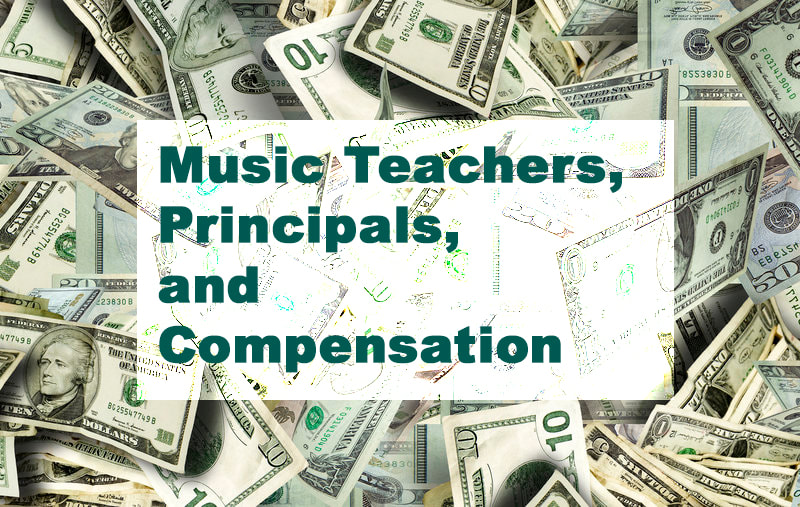|
Yes, as a music teacher, you know going in that you are going to net earn less than an administrator . . . . .
. . . . maybe. Let’s explore. Suppose you are feeling that being a classroom music teacher just wasn’t a good plan for you and that you might want to consider admin. Do you really want to trade being someone’s music teacher for being someone’s principal? Can you see yourself happily doing that job? That said, I know many former teachers who were never as happy as they were as a member of the administration team. If you want to parley your music education position into an admin gig, it's best to do it early in your career. Why? Because the financial rewards you gain with a higher salary will have the opportunity to compound over a longer period of time during your life. The downside of an admin position is, if you are young and starting a family, the job will create a substantial drain on one of your primary assets, namely time. The other reality that needs to be considered is that while you working in a 7.5 hour job, your principal is basically working a 24-hour job with no real time for developing a business. They are on call night and day. You’ve heard of “death by a thousand cuts”? Try “death by a thousand phone calls and emails”. They don't get the options that you do to check out at 3:30. It's as if they have an ankle bracelet on and it's dialed into the school. For wearing that ankle bracelet, they are mightily rewarded but it’s not like you can’t reward yourself in your 16.5 hour business. As a music teacher, you primarily report to a principal. As a principal, you report to everyone above AND below you on the school ladder – and every parent gets their own personalized rung. There is probably no school job description that has changed and ballooned in the past three decades as much as being a principal. Their endless admin responsibilities – especially during Covid – have pushed many principals to the point of leaving the profession. Has their compensation grown commensurately with their increased duties? I don’t think so. The phrase that comes to mind is “Is the juice worth the squeeze?” To their benefit, their “pay and stay” (IRAs and Roth IRAs) investments are sizable and begin compounding right away. In your 16.5 hour business, you report to no one but yourself. Not so for the principal. The bulk of a principal’s medical and health benefits are often the same as yours. They have no union protection nor the legal liability package that comes with NEA membership. They have a different vacation package then you have, and sick days don't really factor into their professional life. If they are out sick, it's typically on their assistant principal or student advisor to pick up the slack. When you're out, you need to leave lesson plans and report your pending sick day on the internet to the substitute service. I’ve seen teachers who groused about coveting their principal’s salary. They lose focus on all the extra responsibilities that come with their boss’s job. Admin are fielding “must answer” calls at ten in the evening and six in the morning while you are developing a deeper relationship with a bag of Cheetos and a Netflix series. You have much more latitude to develop your own down time as well as your business. It’s not what you make; it’s what you keep. Remember my “. . . maybe . . ." back at the top? Don't feel you have to be an administrator or a principle to make a lot of money in the education world. As long as you figure out your 16.5 hour business, you'll be fine but don't hesitate. Do what gives you satisfaction during in those 7.5 hours we refer to as “your job”. If you feel that admin gives you the feeling of “power”, there are many other ways to get that feeling by developing your own business. By focusing on your “business” career, you may be leveraging your autonomy for less front-loaded money but if that is what you are really looking for in your life, you should go for it. Frankly, anyone who pursues a career in education thinking it will fulfill a need for “power” has larger demons to resolve before working with kids or teachers. The gig is about “service”, not “domination” or “power”. “Compensation” comes in a variety of forms. Next to a paycheck and a state pension, the one I valued the most was time – a 7.5 hour job gave me latitude to do a multitude of opportunities to explore different musical interests which often led to a larger revenue stream. Teaching music to kids and developing young proactive leadership qualities in my students was working for me. No admin gig could replicate that sensation for me. Whatever you decide to do, take action today! Start with some research. Talk to friends. Identify the ruts you might be in and recast them as an early chapter in your impending best-selling “success story”. Create a one, five, and ten year scenario that mirrors you and your families values, goals, and wants and start on that plan. And as far as comparing what you and your principal get paid, remember that even if the grass seems greener on the other side, you still have to mow it. Third year music education majors participate in practicum.
Part of this course involves observing a variety of different music educators in the field. Over the years, I was fortunate to have some incredible University of Delaware and West Chester State practicum students observe me teach in a variety of educational settings. With each batch of students, I got my fair share of “You’re amazing!”, “How are you able to get so much done?”, “Is there a trick to it?” and my favorite, “You make it look easy!” While I don’t work with practicum students anymore, should you be reading this and are a bit of a “newbie”, let me elucidate a few basics. If a music teacher you observe in the field “makes it look easy”, realize that whatever they are doing, you are not watching them do it for the first time. Or their second or third time. Nor did they excel in an undergrad class entitled “Make It Look Easy 401”. And as far as “tricks” go, what these effective teachers are doing is only a trick in as much as it behooves a magician to put the rabbit in the hat before the audience shows up if they intend to pull it out during the show. Here’s the deal. After a music teacher has confidently faced classes thousands of times, scripted and edited their presentation on hundreds of legal pads, prepared for every possible student/principal action and reaction, and learned how to be professional, musical, funny, unflappable, and, yes, comfortable in their own skin, “making it look easy” is something that rarely, if ever, enters their mind while teaching – but it is always front of mind for observers. Conversly, when you watch an indecisive, struggling teacher who has a lot of years under their belt, you probably ARE seeing them do something for the first time. For whatever reason, they haven’t ascribed to the idea doing the same techniques over and over with serious analysis and modifying. They are continually trying things for the first time with little connection to anything they’ve tried in the past. They’re looking for that “golden” trick that doesn’t exist. Sort of like “Groundhog’s Day” with instruments. For them, every day is a new opportunity to furtively try something new and go down in flames. Curiously, these struggling teachers are often the first to repeatedly tell you how “professional” they are or trot out their references. They have to resort to this strategy because you are sure as hell not going to see any expertise while they are teaching. It’s a variation of Richard Pryor's line: “Who you gonna believe – my CV or your lyin’ eyes?” “Making it look easy” is a symptom of a teacher who constantly recoils from trying to re-invent the wheel. They choose instead to build a larger wheel and let it roll forward under its own impetus and weight. These teachers never take professional momentum for granted. They are always exploring ways to build on their successes. Find what works with your students and make sure it’s in alignment with your goals - and in the words of Little Feet, "Let it Roll"! So maybe you're saying "Yo, Holmes! How about that young, fresh teacher who makes it look easy? How is it that they make it look so easy so early in their teaching careers?" You can “make it look easy” early in your career if you commit yourself at the outset to self-critique and what can sometimes feel like brutal honesty. The sooner you embrace editing of class presentations, the better off you’ll be. The other thing these terrific tyro teachers sometimes have going for them is that they have, in a short period of teaching gestation, worked in a wider variety of settings with a broader population spectrum than the average teacher. In short, they have seen more in a shorter period of time. They don’t hyper-define themselves as “an elementary general music teacher who does vocal and chorus” or a “middle school instrumental teacher who does concert and marching band”. They see themselves as a musician first, a teacher second – and possess a willingness to embrace any new assignment because they know that in both the short and long run, it will make them a stronger teacher. The more you observe and teach in a variety of settings early in your career, you will create teaching capital that you can invest and compound with every following teaching gig - and the sooner you’ll be one of those teachers “making it look easy”. Hint: take every music teaching gig you can. You’ll realize that those teachers have a few things in common. While “making it look easy” might have once been a component of their lesson plans stacks of yellow legal pads ago, for all of them it has now morphed into a mindset for them. Before you ever observe one of these accomplished teachers, they’ve studied their scripts and dress rehearsed their lessons so many times that “making it look easy” is now part of who they are. It’s in their DNA. By the way, once you master the “make it look easy" look, you are just as adept at the “making it look hard” show, too. “Making it look hard” can be utilized for effect – but know that it will be an act. When music teachers make it look hard and pull it off, they usually only do it to make a point, like because of a specific student (or principal) needs to observe an amplified level of professional grit, tenacity, or effort. But “making it look hard” is always temporary: they always subconsciously revert to relaxed nonchalance. Why? It’s who they are. The real reason that “making it look easy” never enters the head of an accomplished music teacher while they’re teaching is because when they’re teaching, they’re having too much fun. |
AuthorBoyd Holmes, the Writer Archives
June 2025
Categories |





 RSS Feed
RSS Feed